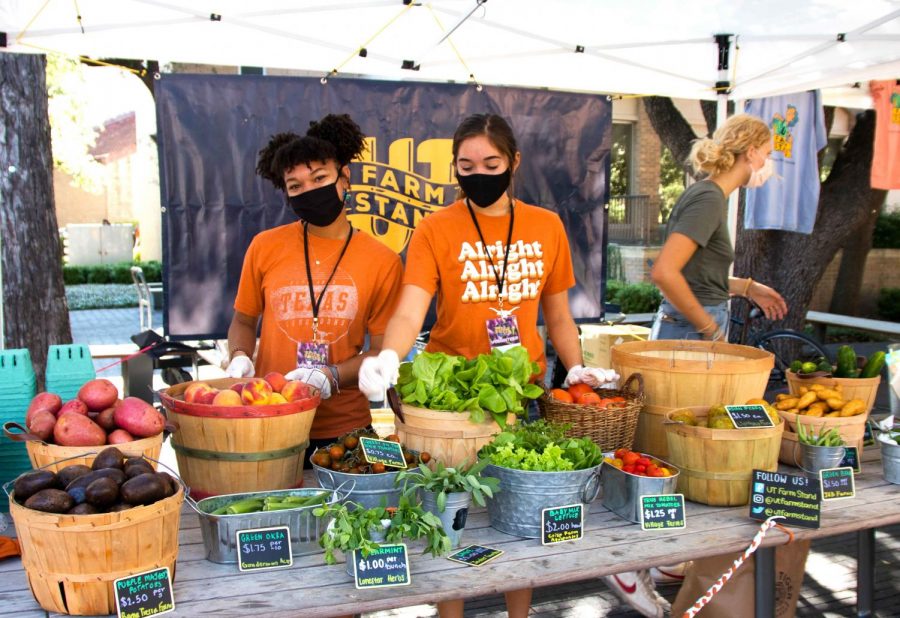Exploring UT Farm Stand and the importance of sustainability
October 7, 2021
Editor’s Note: This article first appeared as part of the September 27 flipbook.
Longing for the taste of fresh fruit, undeclared freshman Lexi Mounger paid a visit to UT’s on-campus farmers’ market. The UT Farm Stand staff prepare days in advance to stock the long table in front of the Jester Center to the brim with honey, fresh pastries and locally grown produce.
UT Farm Stand is a student-led program and a branch of University Housing and Dining that consists of student staff and volunteers who maintain campus gardens, conduct market days and manage zero-waste programs advocating for sustainability.
Neil Kaufman, sustainability manager for UT Housing and Dining, said UT Farm Stand started in 2016 and grew to reflect the sustainable food cycle — from gardening to zero-waste.
UT Farm Stand holds bimonthly market days outside Jester West Dormitory with produce outsourced from a variety of local farmers and other goods such as pastries and fresh honey from partnering Austin-based companies.
“The decision of what to sell is a particularly interesting one because of course you want to sell the stuff that sells really fast, but we want to balance that with the more challenging things, like the broccoli, so to speak,” Kaufman said. “We try to expose the UT community to different produce items through sampling and recipe cards.”
UT Farm Stand uses workshops to educate students about unconventional produce students wouldn’t typically reach for and inform students about sustainable living and eating practices. UT Farm Stand’s market manager, Jackie Wheeler, said at these workshops they show how students can be sustainable from making everyday things like recycled paper to sustainable lip scrubs.
On top of educational workshops, UT Farm Stand also collaborates with University Housing and Dining to promote sustainable environments in the kitchen and with food consumption.
“UT Farm Stand has started collaborating with different sustainable programs under UHD to start waste audits and plate waste studies,” Wheeler, an environmental engineering sophomore, said. “(UHD) does different signage events to see what students are throwing away — If they’re correctly throwing away something into the recycling bin, the compost bin, or the trash can — and how we can create signage to help educate them.”
As UT Farm Stand works hand-in-hand with UHD, gardens maintained by UT Farm Stand provide produce for meals cooked in the University dining halls.
“The food that we grow in the gardens sometimes can go to the kitchens, mostly with herbs that they want to implement into one of their meals,” Wheeler said. “We also just give it to the kitchen staff, and if they want to experiment with something, they can use those.”
The gardens at UT depend on student volunteers organized through UT Farm Stand. Harper Jackson, a government and anthropology sophomore, said volunteering showed them the importance of sustainability in the agricultural industry.
“(UT Farm Stand) mentioned how they would recycle old plants to make compost, so that instead of just throwing things away, they would find a way to repurpose it,” Jackson said.
In Jackson’s experience volunteering, they found that UT Farm Stand’s initiative does its best to make students feel like they’ve made a difference in their community.
“I know that in the local community, I was helping contribute to a difference and that’s a nice thing, ” Jackson said. “A lot of people see things from a global scale and while that’s good, I think it often makes them ignore more local issues that they could actually participate in and make a difference in.”



